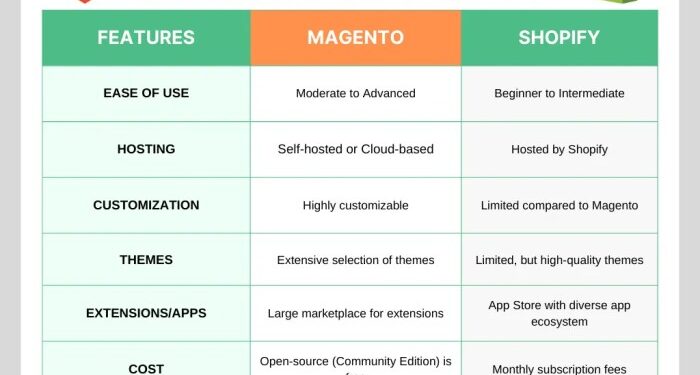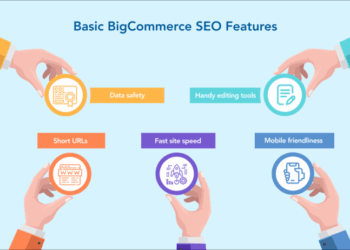In the realm of e-commerce platforms, the battle between Magento and Shopify for superior prowess rages on. Dive into this comparison to uncover the nuances and intricacies that set these two giants apart.
As we explore the key features, differences, and target audiences of Magento and Shopify, a clearer picture emerges of which platform might hold the crown.
Comparing Magento and Shopify
Magento and Shopify are both popular e-commerce platforms that cater to businesses looking to set up online stores. While they serve the same purpose, they have key differences that cater to different types of users.
Overview of Magento and Shopify
Magento is an open-source e-commerce platform that offers a high level of customization and flexibility. It is suitable for businesses with more complex needs and larger product catalogs. On the other hand, Shopify is a hosted platform that is known for its user-friendly interface and ease of use.
It is ideal for small to medium-sized businesses looking for a straightforward e-commerce solution.
Key Features and Differences
- Magento:
- High level of customization and flexibility
- Scalability for growing businesses
- Open-source platform with a large community for support
- Shopify:
- User-friendly interface with easy setup
- Hosted solution with built-in security and updates
- App store for additional features and integrations
Target Audience
- Magento:
- Businesses with complex needs and larger product catalogs
- Companies looking for a highly customizable solution
- Developers and tech-savvy users who want full control over their e-commerce site
- Shopify:
- Small to medium-sized businesses looking for an easy-to-use platform
- Entrepreneurs and startups with limited technical knowledge
- Business owners who prioritize convenience and quick setup
Capabilities of Magento
Magento is known for its robust capabilities, making it a popular choice for e-commerce websites looking to improve their search engine rankings. Let's delve into the key features that make Magento a strong contender in the game.
Built-in Features of Magento
Magento comes equipped with a variety of built-in features that help website owners optimize their online presence for search engines. Some of these features include:
- -friendly URLs: Magento allows users to create custom URLs that are clean, descriptive, and -rich, making it easier for search engines to understand the content of each page.
- Meta tags customization: Users can easily customize meta titles, descriptions, and s for each page, helping to improve click-through rates and search engine visibility.
- XML sitemap generation: Magento automatically generates XML sitemaps, making it easier for search engine crawlers to discover and index all pages on the website.
Tools Available for Magento Users
Magento offers a range of tools and extensions that can further enhance the optimization efforts of website owners. Some popular tools available for Magento users include:
- Magento Suite Ultimate: This extension provides advanced capabilities, including rich snippets, on-page optimization tools, and reports to track performance.
- Meta Templates: Allows users to create dynamic meta tags based on pre-defined templates, saving time and ensuring consistency across the website.
- Canonical URL tags: Magento supports canonical tags, helping to prevent duplicate content issues and consolidate link equity.
Magento Support for Optimization
Magento is designed to support optimization for e-commerce websites through various features and functionalities. Some ways in which Magento facilitates optimization include:
- Mobile responsiveness: Magento websites are mobile-responsive by default, providing a better user experience and improving search engine rankings for mobile searches.
- Site speed optimization: Magento offers caching mechanisms and performance optimization tools to improve site speed, a crucial factor in rankings.
- Robust architecture: Magento's flexible and scalable architecture allows for easy customization and implementation of best practices, ensuring websites are optimized for search engines.
Capabilities of Shopify
When it comes to capabilities, Shopify offers a range of built-in features and tools to help e-commerce websites improve their search engine rankings and visibility. Let's delve into the specifics of what Shopify has to offer in terms of optimization.
Shopify’s Built-in Features
- -friendly URL structures: Shopify automatically generates clean URL structures that are optimized for search engines, making it easier for your website to be crawled and indexed.
- Meta tags customization: Users have the ability to customize meta titles and descriptions for each page, product, and blog post to improve click-through rates in search engine results.
- Mobile responsiveness: With mobile commerce on the rise, Shopify themes are designed to be mobile-responsive, which is crucial for as Google prioritizes mobile-friendly websites in search results.
Tools Available for Shopify Users
- apps: Shopify's App Store offers a variety of apps that can help users optimize their website further, including tools for research, backlink monitoring, and site audits.
- Google Analytics integration: By integrating Google Analytics with Shopify, users can track their website's performance, monitor traffic sources, and analyze user behavior to make data-driven decisions.
- XML sitemaps: Shopify automatically generates XML sitemaps for websites, making it easier for search engines to crawl and index content, ultimately improving visibility in search results.
Shopify’s Support for Optimization
- Canonical tags: Shopify automatically adds canonical tags to prevent duplicate content issues and consolidate link equity, helping to improve website rankings.
- Page speed optimization: Shopify's servers are optimized for fast loading times, which is a crucial factor in rankings as Google favors websites that load quickly.
- SSL certificates: All Shopify websites come with SSL certificates, ensuring secure connections and boosting rankings as Google gives preference to secure websites.
Comparison between Magento and Shopify

When comparing the performance of Magento and Shopify, it is important to analyze the strengths and weaknesses of each platform in terms of search engine optimization. Both platforms have their own set of features and capabilities that can impact the overall strategy for an online store.
Let's delve into the comparison to understand which platform offers better opportunities.
Magento Capabilities
Magento is known for its robust capabilities, making it a preferred choice for many e-commerce businesses looking to optimize their online presence. Some of the key strengths and weaknesses of Magento in terms of include:
- Strengths:
- Customizable URL structures for better optimization.
- Advanced features such as meta tags, canonical tags, and sitemaps.
- Ability to handle large catalogs and complex product hierarchies effectively.
- Weaknesses:
- Requires technical expertise to fully optimize settings.
- Higher initial setup and maintenance costs compared to other platforms.
Shopify Capabilities
On the other hand, Shopify also offers solid capabilities that cater to the needs of online businesses. Here are some strengths and weaknesses of Shopify in terms of :
- Strengths:
- Easy to use interface with built-in tools for beginners.
- Mobile-friendly themes and responsive design for better performance.
- Automatic generation of sitemaps and robot.txt files for search engines.
- Weaknesses:
- Limitations in customizing URL structures for advanced optimization.
- Less flexibility in handling large product catalogs and complex hierarchies.
Overall, both Magento and Shopify have their own strengths and weaknesses when it comes to . Successful strategies on Magento may involve in-depth research, content optimization, and technical enhancements, while Shopify may benefit from on-page optimization, mobile optimization, and content marketing tactics.
It ultimately depends on the specific needs and goals of the online store to determine which platform offers better opportunities.
Migration and Considerations
When considering a migration from Magento to Shopify or vice versa, it is crucial to take into account the impact this move can have on your efforts. Making a platform switch can potentially affect your search engine rankings, so it is essential to plan and execute the migration carefully to minimize any negative consequences.
Impact of Migration on
- Changing URLs: One of the most significant impacts of migration is the change in URLs. Ensure that proper 301 redirects are set up to redirect old URLs to new ones to maintain link equity and avoid 404 errors.
- Optimization: Review your content and meta tags during the migration process to ensure that s are still relevant and optimized for on the new platform.
- Content Preservation: Make sure to transfer all your content, including product descriptions, blog posts, and other relevant information, to the new platform without losing any valuable content.
Tips for Maintaining During Migration
- Perform a Comprehensive Audit: Before migration, conduct a thorough audit to identify any existing issues that need to be addressed during the migration process.
- Backup Data: Create backups of all your data, including metadata, lists, and analytics, to ensure that no crucial information is lost during the migration.
- Monitor Traffic and Rankings: Keep a close eye on your website traffic and search engine rankings before, during, and after the migration to identify any drops and address them promptly.
Best Practices for Preserving Rankings
- Implement 301 Redirects: Set up 301 redirects for all old URLs to new URLs to ensure that search engines understand the changes and pass on link equity.
- Update Sitemap: Submit a new sitemap to search engines after migration to help them crawl and index your new website effectively.
- Monitor Performance: Continuously monitor your website's performance post-migration to identify any issues and make necessary adjustments to maintain or improve rankings.
Final Wrap-Up
As we reach the end of this discussion, the verdict on which platform reigns supreme in capabilities becomes clearer. The insights gained shed light on the strategies that could propel e-commerce websites to new heights.
Commonly Asked Questions
Is Magento or Shopify better for ?
Both platforms offer strong capabilities, but the choice depends on the specific needs and goals of your e-commerce website.
Can I migrate my website from Magento to Shopify without losing rankings?
With careful planning and implementation of best practices during migration, you can minimize the impact on your rankings.
Do Magento and Shopify have similar built-in features?
While both platforms offer tools, the way they are implemented and their effectiveness can vary.






